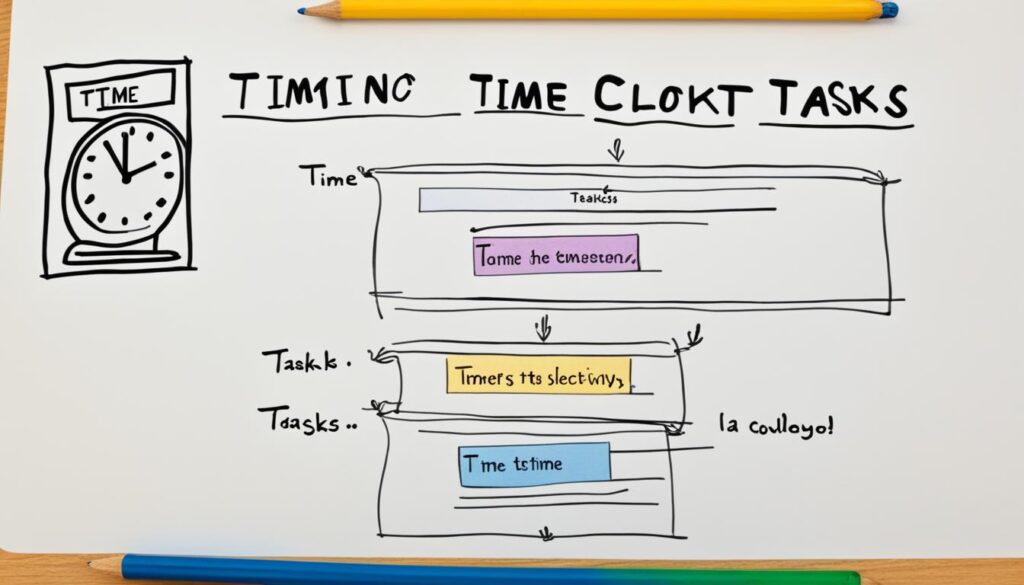Master Time Management Principles for Success

Do you ever feel like there just aren’t enough hours in the day? Are you constantly overwhelmed by your to-do list, struggling to find a balance between work and personal life? Well, it’s time to take control of your time and master the principles of effective time management. But here’s the burning question: What are these principles, and how can they help you unlock your full potential?
Effective time management is not about squeezing more tasks into your day, but rather about prioritizing what truly matters and finding strategies that work for you. By incorporating these time management principles into your life, you can optimize your productivity, reduce stress, and achieve a better work-life balance. So, are you ready to take your time management skills to the next level?
Key Takeaways:
- Time management principles are essential for prioritizing tasks and creating schedules that align with your values.
- Commitment is key to effective time management, emphasizing the importance of creating realistic schedules.
- Pursuing enjoyable activities and integrating fun into your schedule can lead to better work-life balance and overall satisfaction.
- Time focus, rather than task focus, allows you to make the most out of each time period and establish effective routines.
- One thing at a time, as opposed to multitasking, leads to deeper engagement and improved task mastery.
Commitment: The Key to Effective Time Management
The principle of commitment is the foundation of effective time management. It emphasizes the importance of scheduling tasks that you are truly committed to completing. By prioritizing these tasks, you create a realistic schedule that aligns with your goals and values. This commitment ensures that you stay focused and motivated, leading to increased productivity and a sense of accomplishment.
Scheduling tasks that you are truly committed to allows you to avoid creating unrealistic expectations and setting yourself up for frustration. It is essential to be brutally realistic when planning your schedule, considering your abilities and limitations.
To effectively manage your time, follow these steps:
Step 1: Identify Your Commitments
Start by identifying the tasks and activities that align with your goals and values. These commitments should be meaningful to you and directly contribute to your personal or professional growth. They should be tasks that you genuinely want to complete and are willing to invest your time and effort in.
Step 2: Prioritize Your Commitments
Once you have identified your commitments, prioritize them based on their importance and urgency. Consider the impact each task will have on your overall progress and allocate your time accordingly. This will ensure that you are dedicating your energy to the most valuable tasks first.
Step 3: Create a Realistic Schedule
When creating your schedule, be realistic about what you can accomplish within a given timeframe. Avoid overloading your schedule with tasks that are not feasible to complete. Remember, a realistic schedule sets you up for success and prevents feelings of overwhelm and burnout.
Step 4: Evaluate and Adjust
Regularly evaluate your progress and adjust your schedule as needed. Life is dynamic, and unexpected events or new commitments may arise. Be flexible and adapt your schedule to accommodate changes while staying true to your commitments.
By following the principle of commitment and creating a realistic and manageable schedule, you can effectively manage your time and achieve your goals. Remember, effective time management is the key to unlocking your full potential and living a balanced and fulfilling life.
Pursue Fun with a Vengeance: Balancing Work and Enjoyment
Life is not just about work and responsibilities. It is equally important to make time for enjoyable activities that bring you happiness and fulfillment. By pursuing these activities with a vengeance and integrating them into your schedule, you can achieve a better work-life balance and enhance your overall well-being.
When we prioritize work above all else, we risk neglecting our own needs and passions. This can lead to burnout and dissatisfaction, ultimately impacting our productivity and quality of work. By making a conscious effort to pursue enjoyable activities alongside our work responsibilities, we can improve not only our mental and emotional well-being, but also our performance in the workplace.
Whether it’s exploring a new hobby, engaging in sports, or indulging in entertainment, these activities serve as outlets for self-expression, stress relief, and personal growth. They provide a break from the monotony of work and allow us to recharge our batteries, resulting in increased focus, creativity, and motivation when we return to our tasks.

Benefits of Pursuing Enjoyable Activities
The benefits of pursuing enjoyable activities are multifaceted. Not only do they bring immediate joy and satisfaction, but they also contribute to our overall well-being and work-life balance. Here are some key benefits:
- Stress reduction: Engaging in activities we enjoy helps us relax and unwind, reducing stress levels and improving our mental and emotional health.
- Enhanced creativity: Taking a break from work allows our minds to wander, fostering creativity and enabling us to think outside the box when we return to our tasks.
- Improved focus: By giving our brains a rest and engaging in enjoyable activities, we can recharge our mental energy and enhance our ability to concentrate on our work.
- Increased motivation: When we have something to look forward to outside of work, it can boost our motivation and drive to complete tasks efficiently.
Integrating enjoyable activities into our lives is not just a luxury—it is a necessity for maintaining a healthy work-life balance. It allows us to prioritize our own well-being and happiness, leading to greater satisfaction in all areas of life.
Time Management for Balance and Well-being
Time management plays a critical role in balancing work and enjoyment. It involves allocating time for both work and leisure activities, ensuring that neither aspect of our lives is neglected. Here are some time management tips to help you achieve balance and well-being:
- Plan ahead: Dedicate time in your schedule for enjoyable activities, just as you would for work-related tasks.
- Prioritize: Identify the activities that bring you the most joy and make them a priority in your schedule.
- Set boundaries: Learn to say no to tasks or commitments that may interfere with your designated leisure time.
- Create routines: Establish consistent routines that include time for both work and enjoyable activities.
- Avoid multitasking: When engaging in enjoyable activities, give them your full attention and avoid distractions.
| Work | Enjoyment |
|---|---|
| Productivity | Satisfaction |
| Responsibilities | Fulfillment |
| Deadlines | Relaxation |
When we effectively manage our time, we create space for both work and enjoyment, allowing us to lead more balanced and fulfilling lives. So, make pursuing enjoyable activities a priority in your schedule and experience the positive impact it has on your well-being and overall quality of life.
Time vs. Task Focus: Managing Time Effectively
The principle of time vs. task focus is a key aspect of effective time management. Instead of prioritizing specific tasks throughout the day, this principle encourages you to organize your day based on time intervals. By allocating dedicated time blocks to important tasks, you can establish a routine and make the most out of each time period.
When managing your time, it’s important to acknowledge the inherent difficulty in predicting exactly how long each task will take. By focusing on time intervals rather than specific tasks, you can increase your efficiency and productivity. This approach allows for greater flexibility and adaptability, ensuring that you make progress on multiple tasks without feeling overwhelmed.
Establishing Routines and Maximizing Productivity
One of the key benefits of implementing the time vs. task focus principle is the ability to establish routines. By consistently dedicating specific intervals of time to important tasks, you train your brain to focus and perform at its best during those periods. This routine helps eliminate decision fatigue and streamlines your workflow.
Furthermore, by allocating time intervals instead of fixating on specific tasks, you can ensure that each task receives the attention it deserves. This approach eliminates the temptation to rush through tasks or jump from one to the next without completing them effectively. By giving yourself ample time to work on each task, you enhance your attention to detail and the quality of your output.
Implementing Time Intervals: A Practical Approach
To effectively manage your time using the time vs. task focus principle, it’s important to establish a system that works for you. Here are some practical steps to get started:
- Create a daily schedule: Plan out your day by blocking out specific time intervals for different types of tasks.
- Set realistic expectations: Be mindful of how long certain tasks typically take and allocate sufficient time to complete them without rushing.
- Eliminate distractions: During your dedicated time intervals, minimize distractions by turning off notifications, closing unnecessary tabs, and creating a focused work environment.
- Take breaks: Incorporate short breaks between time intervals to recharge and maintain focus.
- Review and adjust: Regularly evaluate your time allocation and make necessary adjustments to optimize your productivity.
Managing Time Effectively: A Visual Representation
Below is a visual representation of how the time vs. task focus principle can be applied in a typical workday:
| Time Interval | Task Focus |
|---|---|
| 8:00 AM – 9:00 AM | Emails and Communication |
| 9:00 AM – 11:00 AM | Project A |
| 11:00 AM – 11:30 AM | Break |
| 11:30 AM – 1:00 PM | Project B |
| 1:00 PM – 2:00 PM | Lunch Break |
| 2:00 PM – 4:00 PM | Meetings and Collaborations |
| 4:00 PM – 6:00 PM | Project C |
| 6:00 PM – 6:30 PM | Wrap-up and Planning for Tomorrow |
By organizing your day in this way, you can prioritize tasks effectively, maintain a routine, and optimize your time management strategies. Remember, the key is to focus on time intervals rather than getting overwhelmed by an ever-growing to-do list.

One Thing at a Time: The Myth of Multitasking
Many people believe that multitasking is an impressive skill that allows them to accomplish more in less time. However, research has shown that this belief is actually a myth. In reality, trying to juggle multiple tasks simultaneously comes with a cognitive cost and leads to decreased efficiency. To truly excel and make the most out of your time, it is essential to focus on one task at a time and immerse yourself in it completely.
When you switch between tasks, your brain needs to constantly readjust and refocus, resulting in what psychologists call “task-switching costs.” This cognitive cost slows you down and increases the likelihood of errors. In fact, studies have shown that multitasking can reduce productivity by up to 40%. So, rather than dividing your attention and spreading yourself too thin, prioritize depth of engagement with a single task.
By dedicating your full attention to one task, you can achieve a state of flow—a state of complete absorption and focused immersion in the activity at hand. This allows you to perform at your best and fully understand and master the task. When you give a task your undivided attention, you are able to tap into your creativity, problem-solving abilities, and critical thinking skills, leading to better results and outcomes.
To fully embrace the principle of one thing at a time, it’s important to minimize distractions. Turn off notifications on your phone, close irrelevant tabs on your computer, and create a quiet and conducive environment that will help you stay focused. By eliminating distractions, you can maintain your flow and achieve a deeper level of engagement with your work.
Remember, quality trumps quantity when it comes to productivity. Instead of trying to do it all at once, prioritize your tasks, and approach them one at a time. Give each task the attention it deserves, and you’ll find that your efficiency and effectiveness will soar.

Block Out Time: Creating Dedicated Time for Tasks
Effective time management requires allocating dedicated blocks of time for specific tasks or activities. By consciously blocking out time in your schedule, you prioritize your tasks and ensure that they receive the attention they deserve. This strategy helps you create a routine that promotes better time management and productivity.
To implement this time management strategy, start by estimating the number of hours per week needed for each task. Break down larger tasks into smaller, manageable pieces and allocate specific blocks of time to work on different aspects of the task. For example, if you have a project that requires 10 hours of work, you can dedicate two hours each day for five consecutive days to complete it.
Creating dedicated time for tasks also helps you establish a routine. When you consistently allocate specific blocks of time for tasks, you develop a habit that enables you to focus and work more efficiently. By following a set schedule, you reduce decision-making fatigue and increase your overall productivity.
By blocking out time for tasks, you avoid the pitfalls of multitasking and improve your ability to concentrate on one task at a time. Research has shown that multitasking can decrease productivity and lead to errors. By dedicating focused time to each task, you give yourself the opportunity to fully immerse in the work, leading to deeper engagement and better outcomes.
Here are some tips to effectively block out time and create dedicated blocks for tasks:
- Identify your most important tasks and assign specific time slots for them.
- Consider your energy levels and schedule demanding tasks during your most productive hours.
- Avoid scheduling back-to-back tasks to allow for breaks and mental rejuvenation.
- Minimize distractions during your dedicated time by turning off notifications and creating a conducive work environment.
- Experiment with different time intervals to find what works best for you, whether it’s shorter bursts of focused work or longer blocks of uninterrupted time.
By blocking out time and dedicating specific blocks to tasks, you take control of your schedule and optimize your productivity. Stay committed to your allocated time and make it a priority to honor the dedicated blocks you have set aside. With this time management strategy, you can accomplish more, increase your focus, and achieve your goals effectively.

Conclusion
Mastering time management principles is the key to achieving personal and professional success. By incorporating these principles into your daily life, you can take control of your time and optimize your productivity. Effective time management techniques and strategies enable you to prioritize tasks, create realistic schedules, and maintain a healthy work-life balance.
By developing your time management skills and utilizing the right time management tools, you can make the most out of every moment. The benefits are abundant – increased productivity allows you to accomplish more in less time, reducing stress and creating more free time for yourself. With better focus and improved overall well-being, you can unlock your full potential and attain your goals.
Remember that mastering time management is not an overnight process. It requires dedication and practice. Start by implementing the principles discussed throughout this article and make them a part of your daily routine. Embrace the art of effective time management, and watch as your productivity soars and your life transforms for the better.
FAQ
What are the key principles of effective time management?
The key principles of effective time management include commitment, pursuing enjoyable activities, focusing on time rather than tasks, tackling one thing at a time, blocking out time for specific tasks, prioritizing important tasks, developing routines, incorporating flexibility, responding rather than reacting to distractions, and organizing the environment for success.
How does the principle of commitment contribute to effective time management?
The principle of commitment emphasizes the importance of scheduling tasks that you are truly committed to completing. It advises against creating unrealistic schedules that lead to frustration and ineffectiveness. By being brutally realistic and only scheduling tasks that can be realistically accomplished, you can avoid the frustration of not sticking to your schedule and create a more balanced and productive approach to time management.
How can pursuing enjoyable activities contribute to effective time management?
The principle of pursuing enjoyable activities encourages you to make time for hobbies, sports, and entertainment. By organizing your academic and other obligations around these commitments, you can achieve a better work-life balance and increase overall satisfaction and well-being. The principle emphasizes the integration of fun activities into your schedule rather than treating them as an afterthought.
Why should we focus on time rather than tasks in time management?
The principle of time vs. task focus suggests that you should prioritize your day based on time rather than specific tasks. By devoting regular intervals of time to important tasks, you can establish routines and make the most out of each time period. This approach acknowledges the difficulty of predicting how long each task will take and encourages you to schedule regular intervals of time to increase efficiency and productivity.
What is the importance of tackling one thing at a time in time management?
The principle of one thing at a time challenges the idea of multitasking and highlights the importance of focusing on one task at a time. Research has shown that switching between tasks incurs a cognitive and time cost, resulting in decreased efficiency. By immersing yourself in one task at a time and minimizing distractions, you can achieve deeper engagement and improve your understanding and mastery of the task at hand.
How can blocking out time for specific tasks contribute to effective time management?
The principle of blocking out time emphasizes the importance of setting aside dedicated blocks of time for specific tasks or activities. By estimating the number of hours per week needed for a task and breaking it down into smaller pieces, you can allocate specific blocks of time to work on different aspects of the task. This approach helps to create a routine and ensures that you have allocated adequate time for each task, leading to better time management and productivity.
What are the benefits of effective time management?
The benefits of effective time management include increased productivity, reduced stress, more free time, better focus, and improved overall well-being. By incorporating time management principles into your daily life, you can prioritize your tasks, focus on what matters most, create realistic schedules, manage time effectively, and achieve a better work-life balance.






